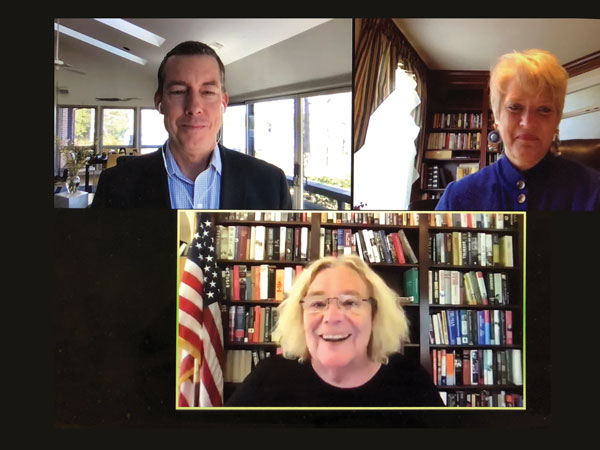4/1/2021
AmericanHort Kicks Off the Legislative Year
Jennifer Zurko
In February, AmericanHort held a two-day, virtual event for its members to learn about its legislative priorities for the coming year and listen to speakers who are active on Capitol Hill.
Called the Congressional Kickoff, it was the first such event for AmericanHort. The COVID-19 pandemic obviously created the option for them to hold this type of event, said Senior VP of Government Relations Craig Regelbrugge, but there’s also a brand new Congress and a new administration in the White House, which will present new opportunities and challenges.
“The only thing you can count on is change,” quipped AmericanHort President & CEO Ken Fisher, who said that the organization’s role is to act as the first line of defense for the horticulture industry when it comes to new legislation and regulations.
“We do not exist to advance one party or the other,” stated Craig. “Our focus is on policy. It’s important to be non-
partisan.”

Here’s a recap from some of the discussions:
H-2B Labor Issues in the New Congress
The H-2B visa program affects the landscape sector of the industry, but since it has a cap, it’s the one that gets a lot of attention.
“If you’re a grower, should you care about H-2B? Absolutely!” said Craig.
Pictured clockwise from top left: AmericanHort’s Craig Regelbrugge, Lynn Jacquez of JPH Law, and Congresswoman Zoe Lofgren (D-CA).
Laurie Flanagan, Executive VP for D.C. Legislative & Regulatory Services, works closely with AmericanHort on the seasonal visa programs. “A lot of landscapers live and die by the cap,” she said.
She ran through what’s going on currently with the H-2B program:
• The first half of the cap was reached on November 16, 2020.
• The second half was reached right before the event, on February 12.
• Before President Trump left office, more limits were put on the cap and it was extended to March 31, 2021. Laurie said they have asked the Biden Administration to rescind this rule.
• The total number of workers allowed under the cap is currently just 65,000 for multiple industries and the Department of Homeland Security has the power to increase the cap. Craig said AmericanHort, along with the H-2B Workforce Coalition, has reached out to DHS, but also the Department of Labor and the White House to help address the need for cap relief.
The H-2B program is typically attached to government spending bills and the last worker release had attachments and limitations. In the spending bill that was passed in December 2019, it included caveats that workers could only come from three specific countries and released in batches. Ultimately, these limitations were put on hold because of the pandemic.
• There’s hope that DOL and DHS will release all 65,000 workers immediately. It won’t technically be a cap increase—we need legislation to do that.
• Another snag has been Trump’s proclamations on temporarily suspending worker visas for COVID-related reasons. It’s unclear on what the Biden Administration plans to do with this.
• Because the new Secretary of Agriculture Tom Vilsack served in the same role under the Obama Administra-tion, Laurie said that there will be familiarity and an understanding of seasonal labor issues. With Mr. Vilsack at the helm, Laurie said they’re hoping for “a reset” on conversations relating to the agricultural workforce.
Lynn Jacquez, AmericanHort’s lawyer for labor issues and principal of JPH Law, said, “This administration isn’t opposed to temporary workers; it’s more what comes with it,” meaning that areas, such as DOL, will also be concerned with things like worker’s rights and the right to join a labor union.
Agricultural Labor Reform
“Immigration, at large, has taken center stage in the Biden Administration,” said Lynn. Speaker of the House Nancy Pelosi has also said this is a priority for the new Congress. “We’ll see how that path forward looks.”
Congresswoman Zoe Lofgren (D-CA), the main sponsor of the Farm Workforce Modernization Act (H.R. 5038) that was passed in the House in 2019, stopped in for a quick update on the bill and how she plans on moving it forward through the new Congress.
“We made tremendous progress in the last Congress,” said the congresswoman, because H.R. 5038 was supported across bi-partisan lines. “It’s not perfect, but we thought it was a good step forward.” (In case you don’t remember, the main focus of H.R. 5038 is on housing for seasonal workers and H-2A reform.)
Under House rules, a bill that previously passed in the last Congress can be put back onto the floor of the new one, as is, by April 1 and Rep. Lofgren is working on making that happen. In February, President Biden unveiled his own immigration proposal that the congresswoman said was good, but it doesn’t address all of the needs for the H-2A program. She and her team of co-sponsors will do markups of President Biden’s proposal and H.R. 5038 to get them on the floor of the House for a vote soon.
Passing through the House is just one hurdle—it then needs to pass through the Senate. But Rep. Lofgren is optimistic. She admitted there are still a lot of steps before it gets to President Biden’s desk, but she’s spoken to a few senators who seemed receptive. Having so many Republican House members supporting the bill helps.
Another positive is the new Secretary of Homeland Security Alejandro Mayorkas. Mr. Mayorkas served as Deputy Secretary DHS under the Obama Administration and Craig said during that time AmericanHort built a very positive relationship with him.
“I’m very bullish on working with the new secretary,” said Rep. Lofgren, who hopes that his department will make positive inroads with regard to H-2A.
Lynn’s thoughts on the Senate are that, although Democrats have control, it’s by a very slim margin, so not much has changed. Because of the Senate cloture rule, and unless the rules of the filibuster are changed, you still need 60 votes to get major legislation passed. In a polarized environment, that’s very hard to do. The last time the Senate actually passed a bill was in 2013.
However, because of new Democratic control, the dynamics are changing on committees, especially on the Judiciary Committee, which oversees immigration and nationalization. The good news is that the new chair is Senator Dick Durbin (D-IL), who’s been a major proponent of immigration and seasonal workforce reform during his tenure.
“We’ve got a lot of educating to do,” said Lynn. “The question is will the Senate push its own bill? What will be their strategy?”
In the short-term, Lynn and Craig said they’ll be focusing on their “regular friends” in the Senate and focus on the more moderate members of both parties. And they expect more scrutiny on farm workers, especially on the regulations side (i.e., increased OSHA rules and wage rates).
“We have a full plate to keep an eye on,” said Lynn.
Clockwise from top left: AmericanHort’s Craig Regelbrugge, Lynn Jacquez of JPH Law, and Congresswoman Zoe Lofgren (D-CA).
The Housing Market in 2021
Dr. Robert Dietz, the chief economist for the National Association of Home-builders, presented his thoughts on what the status of the current housing market means for the green industry.
• Housing was a bright spot in 2020, accelerating growth into 2021 with increases in interest rates.
• Housing affordability risks erosion in 2021 due to higher construction costs.
• There’s a large gap between income and consumer spending. This is why the stock market is doing well even though the overall economy is not.
• Home ownership rates are around 66%. Some households will be priced out of the market and be forced to rent.
• The No. 1 challenge for builders is shortages/delays in product, especially lumber. No. 2 is delays in permitting.
No. 3 is finding labor.
• The U.S. needs to increase the domestic supply of lumber, otherwise we will start seeing significant negative impacts on the housing market. It’s the No. 1 issue his organization is talking to legislators about.
• Since The Great Recession, there was a big gap between new home construction and buying existing homes. That is now closing.
• The biggest demands for builders during the pandemic were: home offices; new homes built in the suburbs; and outdoor features like lighting, patios, and front and back porches.
• Currently, 30% of new home construction takes place in smaller metro areas (those outside of large suburbs). Multi-family homes are a large growth category, too.
• The remodeling market is expanding as people use their homes for more purposes.
• During the pandemic, the first round of job losses affected lower-income individuals, affecting rental properties. Now, as companies plan their 2021 budgets, we’re starting to see more cuts in white-collar jobs. We will start seeing more empty office buildings as companies downsize and some companies will be looking to relocate.
Tax Issues in 117th Congress
Beth Swanson and Brian Kuehl from K•Coe Isom, an agricultural advisory and financial services firm that works with AmericanHort members, went over expectations from a tax legislation standpoint. Brian said they handle taxes “from policy to plate.”
New Secretary of the Treasury Janet Yellen indicated that tax increases are likely in the event an infrastructure package is passed this year and that they would probably be phased in over time.
• Because of their narrow majority, Democrats can’t get too crazy with tax reform. Any hope of repealing the entire Tax Cuts & Jobs Act (TCJA) that was passed during the Trump Administration is probably unrealistic. We’d most likely see small adjustments to parts of the bill instead of the whole thing.
• The biggest item that could potentially change in the TCJA will be individual tax rates. President Biden has indicated he wants to increase the rate of the top tiers from 10% to 37%.
• The Qualified Business Income Deduction for pass-through entities and sole proprietorships in Schedule C and F is set to sunset after 2025.
• In the TCJA, the corporate tax rate was set at a flat 21%. President Biden says he wants to increase that to 28%, but said he would settle for 25%.
• The Business Interest Expense Deduction and the Excess Business Loss Limitation will probably not see any changes.
• Beth and Brian said that all tax advisors will be extremely busy in Q4 of 2021—don’t wait until new bills pass to reach out to your tax advisor, especially on payroll tax credits like family medical leave, and the Estate & Gift Tax because it will mostly likely go up.
They’re also advising their clients to request an extension on filing their taxes because there will be a lot of changes coming down the pike. You want to avoid having to file amendments.
• Three things to watch for from this Congress: 1) The Estate & Gift Tax—They’d rather families not aggregate their wealth by passing it from one family member to another; 2) An increase in corporate tax rates—Everyone pays their fair share; and 3) Capital gains—Rewarding work over investors.
A Discussion With the House Agriculture Committee
Keith Jones, a senior professional staff member of the House Agriculture Committee, discussed what we can expect on the legislative side.
• The new chairman is Congressman David Scott (D-GA), who’s the first Black chairman to serve on the Agriculture Committee.
• The committee will have a large focus on climate change. Sec. Vilsack is already gearing up the USDA to quantify carbon sequestration on row crops. “Horticulture can play a large part in this,” said Keith. “You’re structured to help.”
• The status of Black farmers and other minority producers will also be a focus. There will be a hearing soon to look at equity with regard to growers.
• “To beat China, we can’t let any pool of talent go untapped,” said Keith, so the committee will also be looking at putting more money toward scholarships for land-grant universities. “This has been under-served and under-funded for far too long.”
• The need to address food insecurity and hunger is “an intense topic on the committee,” said Keith.
• Other issues Rep. Scott and the committee will be looking at is broadband access for rural areas and how we address disasters (mostly weather-related) when they affect agriculture, which will probably be included in the next iteration of the Farm Bill.
√ Labor is not under the Ag Committee’s jurisdiction, but it’s highly related. “We haven’t kept up with addressing the needs for ag since 1986,” when the last seasonal labor bill was passed. Keith said the Farm Workforce Modernization Act “is a great piece of legislation and very bi-partisan” and is optimistic Rep. Lofgren will get some traction behind it.
Craig, who hosted the discussion with Keith, mentioned that any solution will need to be bi-partisan and that there’s some concern with the progressive wing of the Democratic party derailing the farm workforce bill.
“There’s recognition at the leadership level that we really have a slim majority,” said Keith. “We’re working with thoughtful, moderate people to help make those decisions.
“These are interesting times. The Agriculture Committee is going through great change.”
—JZ

Watch My Interview With Craig
Back in mid-February, I sat down for a Zoom interview with AmericanHort’s Craig Regelbrugge, Senior VP of Government Relations, to talk about the association’s legislative agenda for 2021. We talked about the new Biden Administration and cabinet members, our industry’s seasonal workforce and visa worker programs, regulations on water and plant protection and more.
Go to the GrowerTalks YouTube channel to check it out. —JZ
A U.S. Senator Gets GrowerTalks
The senator in question is the honorable Chuck Grassley of Iowa, who was presented with the issue by Mike Gooder of Plantpeddler, whom the senator visited last week.
 “It is always an honor and privilege to spend time with Senator Grassley,” Mike said. “We have been fortunate that, since 1995, the senator has been interested in our company and industry. Several times he has come to our support, including during the first major Ralstonia outbreak.”
“It is always an honor and privilege to spend time with Senator Grassley,” Mike said. “We have been fortunate that, since 1995, the senator has been interested in our company and industry. Several times he has come to our support, including during the first major Ralstonia outbreak.”
On this particular visit, much of the discussion related to the agriculture labor situation and re-engaging the workforce post-COVID, Mike said. They also discussed the impact on small businesses of the pro-posed increase to the minimum wage, potential changes to the tax code that will have a negative impact on our industry and related agricultural enterprises, the cost of energy and a potential carbon tax, and the opportunity to expand Federal Crop Insurance to crops produced under cover.
Added Mike, “There was humor also when I asked the senior senator about his bout with COVID, which he shrugged off as nothing more than a little like having a cold. ‘Heck, I didn't even know I had it until they tested me.’”
As for why Mike gifted him with a copy of GrowerTalks? It was the February issue, which features a story about Plantpeddler’s three new ISO cutting sticking machines in the two-page spread on page 12.
“Through the years, he has been interested in the technology utilized by the greenhouse industry and Plantpeddler, so it was a great opportunity to discuss the installation of our robotic sticking robots, which were featured in the February edition. He wanted to take a copy with him, so I was honored to provide a copy.”
—Chris Beytes
News, views, commentary and event coverage about the policies and legislation that directly affect our industry. Share your thoughts, opinions and news with me: jzurko@ballpublishing.com.